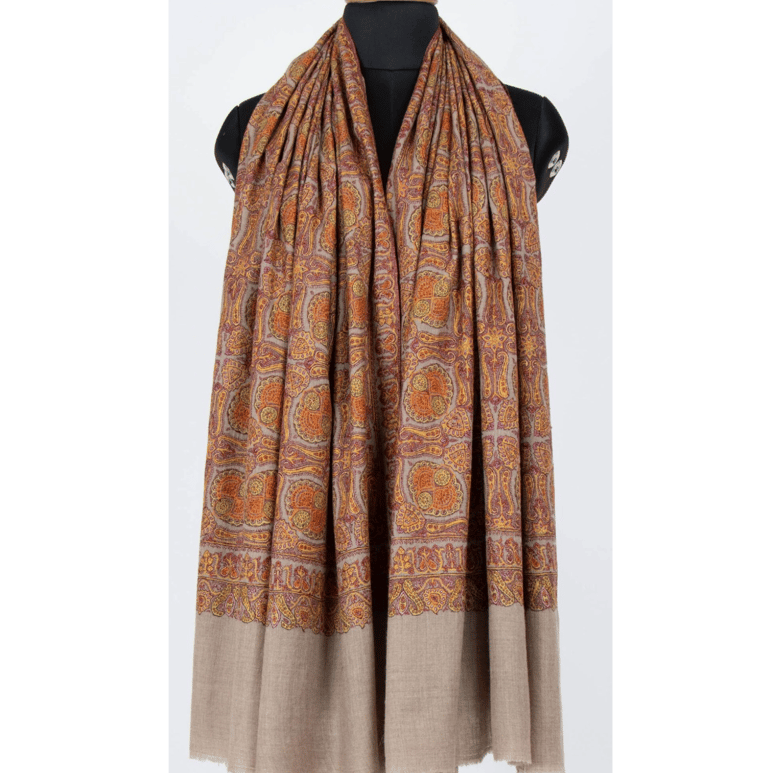Enjoy exclusive discounts on pashmina shawls!
Crafting Elegance, Embracing Warmth
Discover our exquisite collection of handcrafted pashmina shawls, ethically produced for your comfort and style. Experience the luxury of warmth and grace this winter.


Ethically Made
Contact Us for Assistance
Reach out for queries or support regarding our handmade pashmina shawls, crafted with care for you and the artisans.
Support
Tel & Whatsapp +1 302 329 5895
Inquiry
contactus@mypashmina.store
Authentic Kashmiri Pashmina shawls are renowned worldwide for their luxury, craftsmanship, and heritage. Here's what makes them truly special:
🐐 1. Rare and Exquisite Wool
Source: Made from the under-fleece of the Changthangi goat, found only in the Ladakh region of Kashmir (at altitudes above 12,000 ft).
Fineness: The wool is extremely fine (12–16 microns) — much softer and lighter than regular wool.
Warmth: Despite being feather-light, it provides exceptional insulation.
🧵 2. Handspun and Handwoven
No machines: Authentic Pashmina is entirely handspun, handwoven, and hand-embroidered — a process that can take weeks to months for a single shawl.
The craftsmanship is passed down through generations of Kashmiri artisans.
🎨 3. Intricate Embroidery (Sozni, Papier-Mâché, etc.)
Traditional Kashmiri embroidery styles like Sozni (fine needlework) and Kani (woven patterns using bobbins) elevate the artistry.
Some shawls feature elaborate patterns that can take months or even years to complete.
🪶 4. Unmatched Softness and Lightness
A real Pashmina shawl can pass through a wedding ring — a classic test of authenticity.
The texture is soft like butter, with a natural warmth and drape.
📜 5. Cultural and Historical Value
Historically worn by royalty and nobility — from Mughal emperors to Napoleon’s wife Josephine.
Recognized as a symbol of elegance, refinement, and prestige.
🛡️ 6. GI Tag & Certification
Kashmiri Pashmina has a Geographical Indication (GI) tag to protect its authenticity.
Certified shawls carry a label from the Craft Development Institute (CDI), Srinagar to prove origin and quality.
💰 7. High Value and Longevity
Due to its rarity and labor-intensive process, a genuine Pashmina shawl is expensive, often costing hundreds to thousands of dollars.
But it lasts generations if cared for properly — becoming an heirloom.
✅ How to Identify a Real Pashmina Shawl
1. Touch and Feel
Softness: Genuine Pashmina is butter-soft, lightweight, and has a luxurious feel.
Warmth: Even though it's thin, it feels warm the moment it touches your skin.
Fake alert: If it's too smooth or glossy, it's likely a silk or viscose blend.
2. The Ring Test
A real Pashmina shawl can easily pass through a small ring, like a wedding ring.
This is because the weave is very fine and delicate.
⚠️ Note: Some silk-blend fakes can also pass this test — so it’s not foolproof alone.
3. Check the Weave
Authentic Pashmina is handwoven, so it will have tiny irregularities in the weave.
Machine-made shawls are uniform and perfect — which is a red flag.
Hold it up to light — you should see subtle inconsistencies in the threads.
4. Check for GI Tag or Certification
Genuine Kashmiri Pashmina often comes with a Geographical Indication (GI) tag or a label from the Craft Development Institute (CDI), Srinagar.
This guarantees that the shawl was made from Changthangi goat wool and handcrafted in Kashmir.
5. Burn Test (only if you're desperate — not recommended for buyers)
Pull a tiny thread from the edge and burn it.
Real Pashmina: Smells like burning hair, leaves a crisp ash.
Fake (synthetic): Smells like plastic, melts into a hard bead.
⚠️ Use only as a last resort and preferably under supervision.
6. Embroidery Type
Sozni embroidery on real Pashmina is done by hand using fine silk or cotton threads.
Fake versions often use machine embroidery that looks rougher and is denser.
7. Price Point
Authentic Pashmina is expensive due to the labor and rare wool.
Expect to pay starting price INR 10,000 + (or USD 150 +) for a real one.
Anything too cheap claiming to be "pure Pashmina" is almost certainly fake.
8. Origin
Ask about the origin: A real Kashmiri Pashmina is made in Srinagar or nearby areas in Kashmir.
Some retailers also falsely sell products from Nepal or China as "Kashmiri Pashmina."